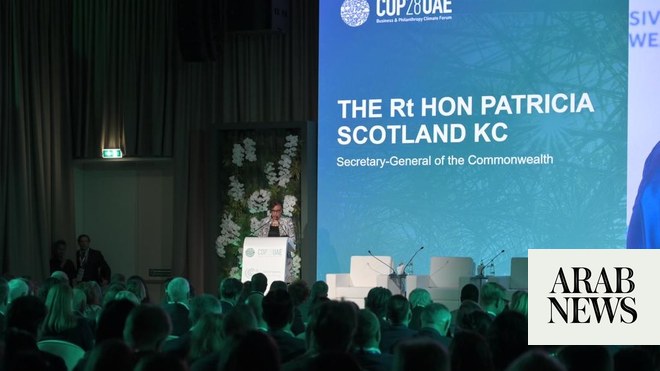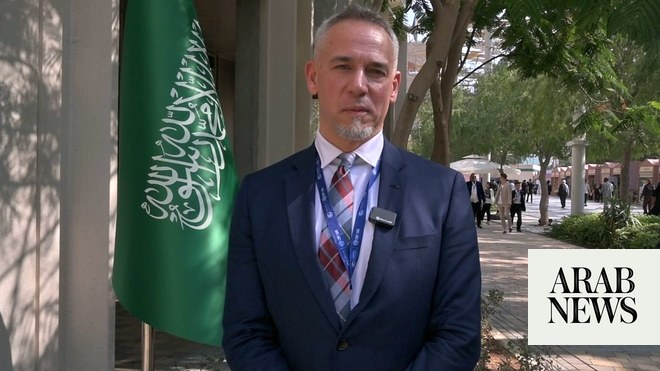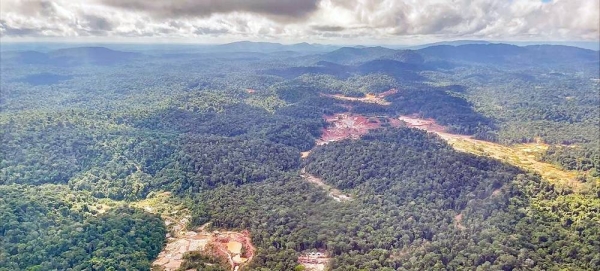
DUBAI: The private sector can no longer be on the periphery of energy transition efforts, Commonwealth Secretary-General Patricia Scotland has insisted on the sidelines of the UN Climate Change Conference.
Speaking at the Business Philanthropy Climate Forum — a first-of-its-kind event held alongside COP28 in Dubai — Scotland appealed directly to commercial enterprise leaders to use their capital, talent and innovative capacity to tackle global warming.
The event brought together over 1,300 CEOs and philanthropists, as well as 250 foundation heads from 55 countries, with the aim of facilitating a paradigm shift toward collaborative, action-oriented participation.
Addressing the forum, Scotland said: “The idea that the private sector is peripheral to such a profound crisis cannot be the standard.
“The private sector is exposed to the impacts, and it is central to the solution, not just through the provision of capital, but through your capacity to innovate.”
In the inaugural year of the global stocktake, it has become evident at this COP that, despite ongoing global efforts to offset emissions, the gap between current progress and necessary benchmarks continues to widen, according to Scotland.
In order to meet the ambitious target of achieving net zero, an estimated $4 trillion is needed each year until 2030. This includes an unprecedented investment required for deploying the vital technology essential to accelerate the energy transition, as outlined by the secretary-general.
In 2021, climate finance flow amounted to $630 billion, just a sixth of the required amount, emphasized Scotland.
She added, “We cannot fill this gap without the private sector … without accessing the right private sector support potential to unlock transformational investment in mitigation and adaptation, especially for small, vulnerable, and developing countries.”
Scotland emphasized the necessity of collaborative efforts to create the right environment to enable these investments, addressing upfront costs, long time horizons, and the absence of data — factors that can make a crucial difference and fulfill the required conditions.
The notion that the private sector is independent of the effects of climate change is not one that is rooted in truth, Anil Soni, CEO of the World Health Organization Foundation, said while speaking on a panel at the forum.
He emphasized the cascading effects of natural disasters and severe weather events, which ultimately disrupt supply chains and affect businesses.
Soni cited the cholera outbreak in Malawi as a consequence of flooding, leading to health issues, migration, potential conflicts, and subsequent impacts on business returns, supply chains, and customers.
“Because of all of that, you see climate change in practice through health effects; you see it in conflict, and you see it in your business returns. Businesses should be motivated because, you know, this is going to affect your supply chain, and you know what’s going to affect your customers,” he explained.
Speaking at the forum, Brian Moynihan, CEO of Bank of America, reaffirmed that the private sector is the necessary piece needed to bridge the gap. He deemed the energy transition a business and operational challenge that the private sector must deploy its talent, capabilities, and money to overcome.
Moynihan emphasized that the public sector cannot achieve this massive undertaking alone.
He stated, “They (the public sector) don’t have the money and the talent that’s in this room, represented by all of you. So, we’ve got 48 hours to get to work. Let’s take action; let’s make progress.”
As one of the key private sector players at the forum, Amazon’s Chief Sustainability Officer Kara Hurst highlighted the company’s shift in investments toward companies that can develop new technologies for achieving net-zero goals.
Amazon, for the third consecutive year, held the position of the largest corporate purchaser of renewables globally, with a 23 gigawatt portfolio, Hurst noted.
Through the BPCF, the company aims to “share how we’re doing this, and we want our supply chains to be involved in that as well. So, there’s a lot of work to do collaboratively in these areas, and a lot that I think that we can do together and collectively.”
During his inaugural address, Jafar Badr, chairman of the BPCF, stressed that governments, businesses and philanthropists cannot continue to operate in silos, adding that the private sector must fulfill its crucial role in ensuring a just transition.
Referring to the breadth of nationalities and organizations at the event, Jafar said: “This unprecedented scale and diversity sends a clear and powerful signal that the private sector is ready to engage. And in doing so, business and philanthropy will become the connective tissue between COP presidencies.”
He added: “This powerful partnership can facilitate consistent progress towards Net Zero, no matter which way the political winds are blowing in capitals around the world.”
The call for more private sector involvement was echoed by the head of the Financial Services Regulatory Authority at Abu Dhabi Global Markets, Emmanuel Givanakis.
Speaking at the forum, the CEO insisted that regulators need to show more flexibility to adapt to the evolving landscape of sustainable finance.
“The public sector can’t do everything, it"s gotta be a combination of both. We are all in this together, this great thing that we are going through is something we’re all having to tackle – we can’t ignore it anymore,” Givanakis said.
“Policymakers need to facilitate better governance around transition, seeing companies start to think about transition as part of their journey going forward,” he added.
Givanakis praised the recent actions of the sustainable finance working group in the UAE, which has come out with a set of high-level principles encouraging boards to deal with financial risk around transition and climate change.
In March last year, ADGM built the world’s first regulated carbon trading exchange and clearing house in partnership with the global greenhouse house gas company, AirCarbon Exchange.
“That framework in essence, took carbon as a carbon-offsets and created them in what we call environmental instruments, and that"s just part of the journey, and carbon markets in themselves are not the solution to transition alone. They"re just one segment,” Givanakis said.
Another critical area of emphasis in Givanakis’s agenda involves bonds and sustainably linked instruments, underscoring the importance of the finance industry directing capital to the right places, whether in the southern or northern hemisphere, to address global climate challenges.
Referring to forecasts by the International Energy Agency on the evolving landscape of energy sources, particularly focusing on solar and wind energy, Shemara Wikramanayake, CEO of financial services group Macquarie said that solar will become the world"s largest energy source by 2050.
However, she added: “There are intermittent sources of energy, and the transition journey is a meandering one, not just for those in finance, but in the real economy.”
Additionally, Wikramanayake provided an example in the shipping industry, illustrating how a shift from liquefied natural gas to methanol has proven successful in reducing emissions.
“We have now 200 ships and shipyard being developed and running on methanol instead of LNG because human innovation and technology bring costs down,” she said.
On the note of calling people to action, Givanakis concluded his statements by encouraging open-mindedness and innovation in addressing challenges, particularly emphasizing that existing solutions may not be the only answer.
“Don"t think that the only solutions are the ones that we already have. If we put our minds together we can solve a lot of problems, and major ones like climate change,” he said.












